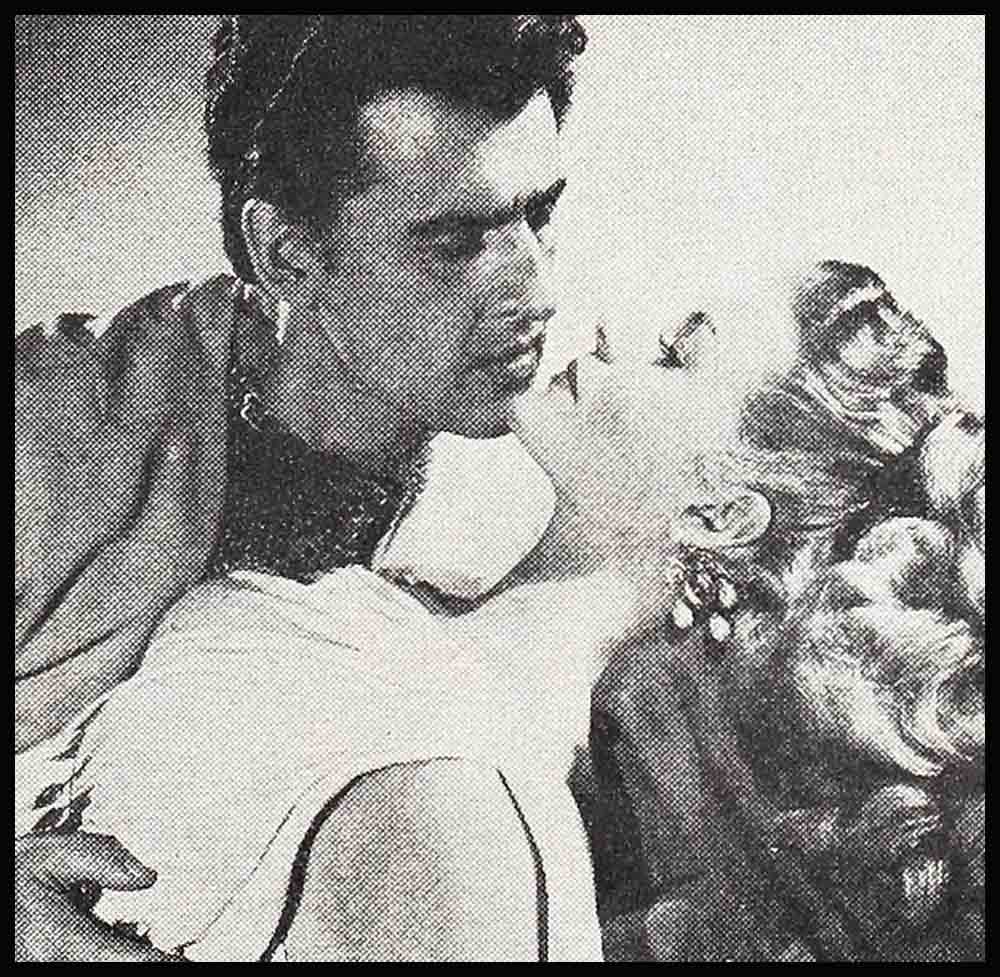
Go Out To A Movie
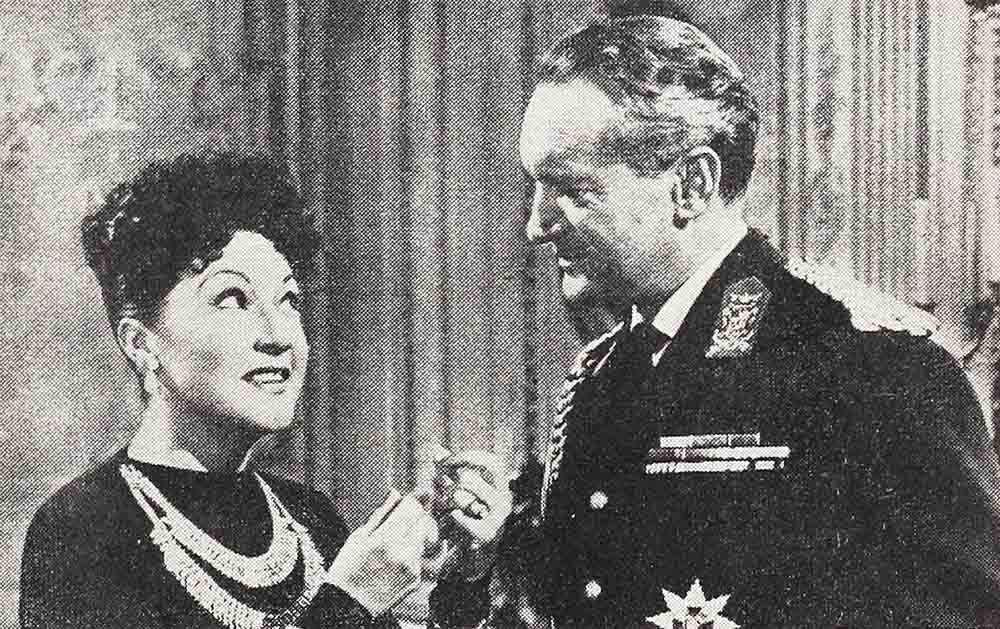
CALL ME MADAM (20TH CENTURY-FOX, TECHNICOLOR)
The tuneful story of “The Hostess with the Mostes’ ” sweeps onto the screen as just about the cheeriest musical ever made, vibrant with irresistible personalities. Ethel Merman’s warm self-assurance and matchless gift for selling songs make the lady ambassador a memorable figure, shrewd but susceptible, uncouth but knowing, wearing gorgeous costumes with an air. Donald O’Connor’s next in line, playing her young press attache with his unique blend of brashness and humility, his precise sense of rhythm. Sedate princess Vera-Ellen keeps step with him entrancingly in dancing numbers. But George Sanders is a real surprise. Heretofore a pretty chilly type, he eases into the film’s good humor; his suave diplomat becomes a genuinely charming gent. Even the plot, about a tiny mythical country out for a U. S. loan, is as bouncy as the Berlin score.
Verdict: Lush, lovable, star-bright musical (Family)

MAN ON A TIGHTROPE (20TH CENTURY-FOX)
Once upon a time, a small circus sneaked through the Iron Curtain to freedom. Here’s a film inspired by that true incident, with a mixed flavor of fairy-tale and bitter reality. Fredric March, in a superb portrayal, is the harassed showman who quietly plans escape from the prying and bullying of Czechoslovakia’s Reds. There are two love stories, both torrid. Gloria Grahame’s at her most sensuous as March’s second wife, abusing him for his apparent spinelessness. Terry Moore, as his daughter, and Cameron Mitchell, as a roustabout with a vague background, team in a spirited youthful romance. Minor roles are done with color and conviction—even the Communist heavies, notably Adolphe Menjou. As the getaway plot builds to its climax, the audience increasingly shares the desperate urge to breathe the free air across the border.
Verdict: Witty, picturesque triumph of suspense (Adult)
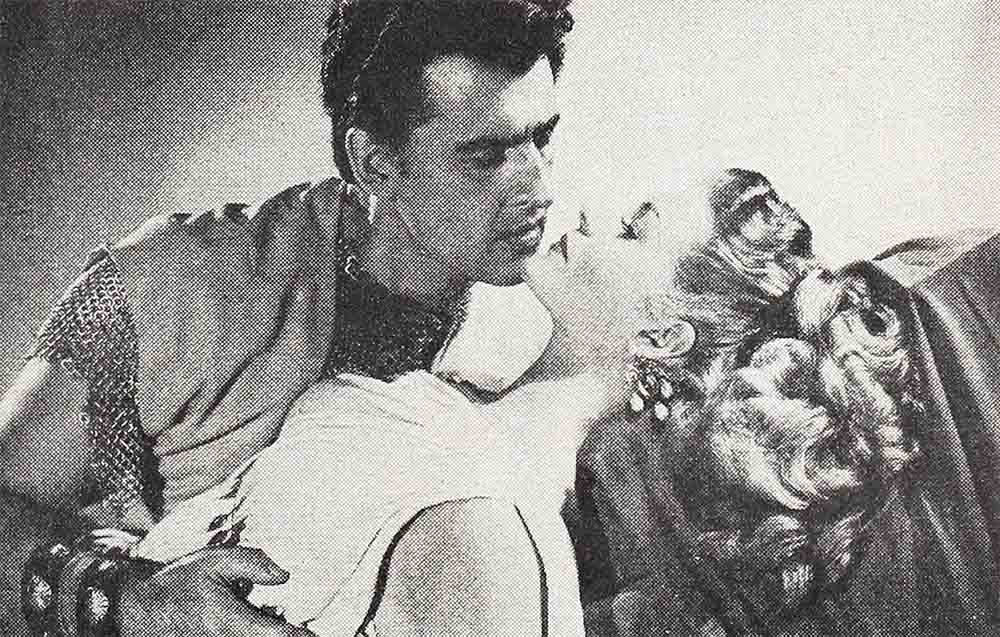
SALOME (COLUMBIA, TECHNICOLOR)
The saga of the lady with the seven veils is in the tradition of the most successful Biblical-era films, providing spectacle, sex and inspirational values. Rita Hayworth affirms her rank as one of the screen’s great beauties, though her Salome is more on the side of the angels than the gospel indicates. But the spare, powerful narrative of the Scriptures is expanded to generally good effect, as Christianity challenges a debauched court in a far corner of the Roman Empire. Playing a Roman convert, Stewart Granger is almost as handsome as Rita. Judith Anderson’s Queen Herodias is convincingly ambition-ridden, and Charles Laughton makes King Herod evil and pitiable. Alan Badel’s John the Baptist, however, has too much of the fanatic about it. Gaudy as it is, the movie’s closer to the spirit of the story than earlier fictional treatments.
Verdict: Satisfying if superficial pageantry (Adult)

TROUBLE ALONG THE WAY (WARNERS)
Cross “Going My Way” with the yearly football epic, add a generous dash of humor, and you have this affable John Wayne movie. Charles Coburn gets his juiciest role in years as the long-time headmaster of a small Catholic college about to be closed for lack of funds. As in the Crosby film, these good fathers are very human beings, full of human crotchets. Wayne’s an agreeably tough hero, a once-famous football coach blackballed because of a fondness for the bottle and a hazy sense of athletic ethics. The unworldly Coburn hires him to put the college on its feet with a winning team, and Wayne uses outrageously direct means to this end. Sherry Jackson, a forthright child actress, is the brightest part of a sub-plot involving Wayne’s daughter, his selfish ex-wife (Marie Windsor) and the social worker (Donna Reed) checking on the child’s welfare.
Verdict: Impudent comedy, appealing sentiment (Family)
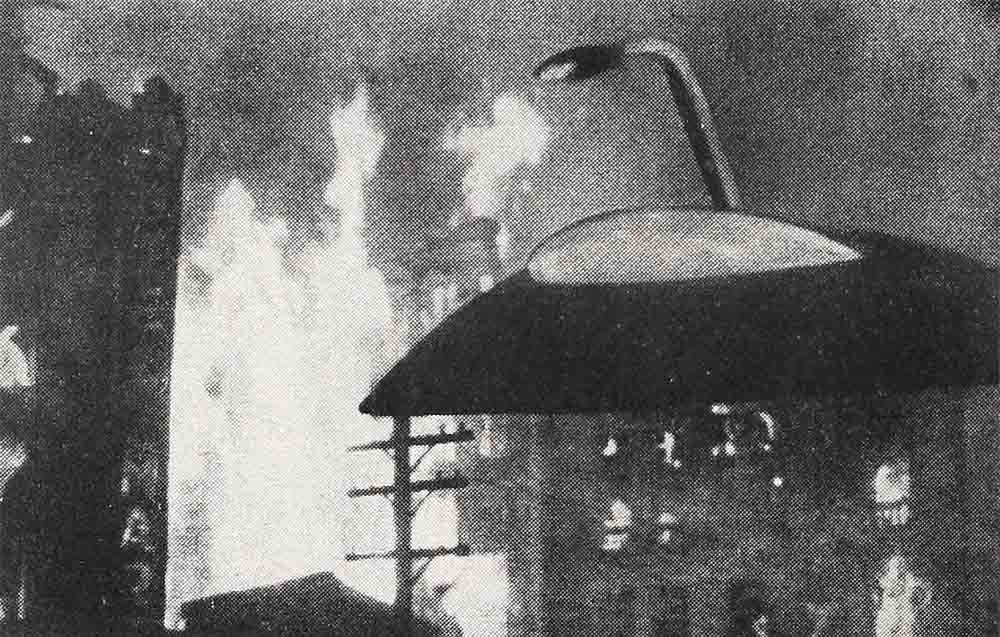
THE WAR OF THE WORLDS (PARAMOUNT, TECHNICOLOR)
Riding high on the crest of the current enthusiasm for science fiction comes a chiller that will have movie-goers nervously scanning the sky for flying saucers as they leave the theatre. We’re targets of an imagined Martian invasion, starting in Southern California and then clutching at the rest of the earth. The people chiefly concerned are sketched lightly: scientist Gene Barry; his sweetheart, Ann Robinson; a general, Les Tremayne, who finds the U. S. Army’s most potent weapons—even the atomic bomb!—are helpless against the invaders’ superior gadgets. The cast plays second fiddle to the special-effects man. We get a good look at the awesome machines issuing from the space ships; the glances at the monstrous beings who run the machines are terrifyingly brief. Subtlety and documentary detail are missing, but the visual impact is strong.
Verdict: Good, horrible, fantastic(?) fun (Family)
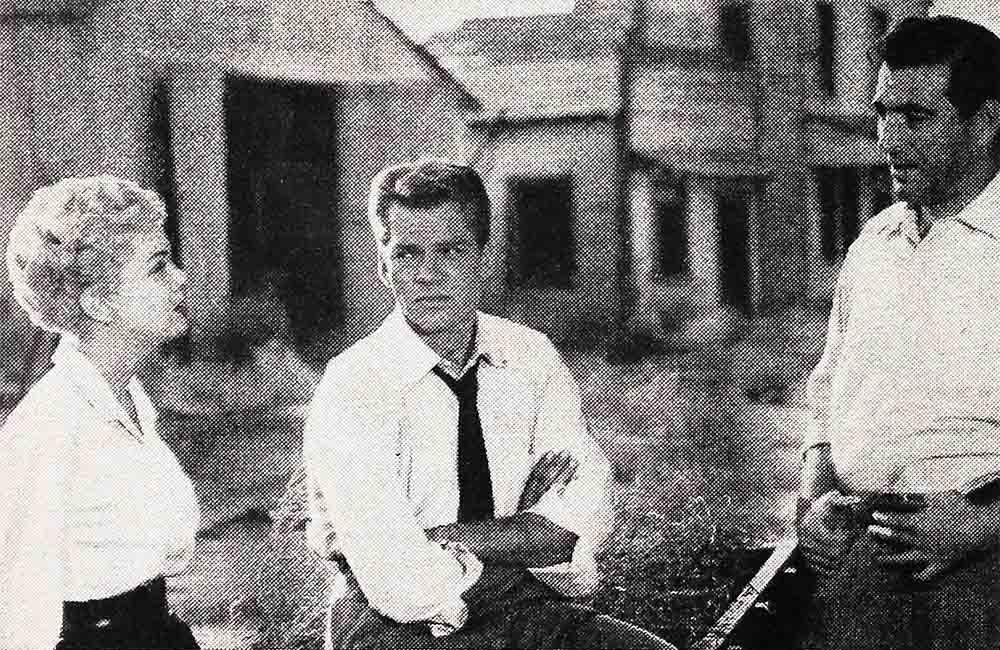
SPLIT SECOND (RKO)
Collect a few miscellaneous strangers; isolate them in a dangerous situation; and you have a time-tried formula for good melodrama. Tops in this group is the able, extremely attractive Keith Andes, as a reporter whose assignment is switched from the latest A-bomb trial to the prison break of some public enemies. In the western desert, Keith picks up a hitchhiker (Jan Sterling), a plucky gal who’s been around. Both are captured by the fugitive killer (Stephen McNally), whose loyal companion (Paul Kelly) was wounded in the escape. Other captives—an old prospector (Arthur Hunnicutt), a restless wife (Alexis Smith), her lover (Robert Paige) and, eventually, her doctor husband (Richard Egan)—are also trapped in the ghost town that’s to be at the center of the bomb blast. Credit Dick Powell for a brisk, efficient debut as a director.
Verdict: Smart, up-to-the-minute action story (Family)
THE PRESIDENT’S LADY (20TH CENTURY-FOX)
History provides a batch of sure-fire elements—Indian-fighting, a tender love story, drama that aims straight for the heart—to make a satisfying vehicle for Susan Hayward and Charlton Heston. Big events are subordinated to the personal lives of Rachel and Andrew Jackson, pursued by the undeserved scandal surrounding Rachel’s unhappy first marriage. As the maligned wife of the future president, Susan is beautiful and deeply sympathetic, while Heston—showing a striking resemblance to Old Hickory—gives his best performance so far. Backgrounds, with well-done minor characters, carry an exhilarating flavor of early America.
Verdict: Highly emotional close-up of a famous marriage (Family)
DESTINATION GOBI (20TH CENTURY-FOX, TECHNICOLOR)
Wild as this yarn may seem, it, too, takes its inspiration from fact. Richard Widmark, able as always, has another of his serviceman roles, this time with a weather unit in Mongolia near the close of the war with Japan. The fast-moving plot pits him against wily Mongol tribesmen, hostile Japs and the hazards of the Gobi Desert. Casey Adams, Don Taylor and Darryl Hickman are stand-outs among his fellow GI’s, while Murvyn Vye scores as a chieftain of doubtful allegiance, Judy Dan as a Mongol maiden. Excellent photography plays up the magnificent scenery (Nevada dubbing for Mongolia).
Verdict: Ripping adventure tale, rich in action, humor, good acting (Family)
BRIGHT ROAD (M-C-M)
This gentle story of a confused little boy and an understanding teacher happens to take place at a Negro grade school in the South. Lovely Dorothy Dandridge, known chiefly as a singer, approaches the business of acting with disarming simplicity, playing a young teacher who refuses to believe that the problem child of her first class is really backward. Philip Hepburn’s a delightful hero, a stubborn rebel in school. though his interest in nature and its creatures shows keen latent intelligence. Only catch is, the reason for his hostile attitude is never explained; his family, though poor, is a loving group. An implied romance teams Dorothy with the principal, Harry Belafonte. Also a singer, a young man with a fine, thoughtful face, Belafonte is ill at ease as an actor. He does one ballad—irrelevant, but spellbinding.
Verdict: Winning, though slightly blurred study of childhood (Family)
BY THE LIGHT OF THE SILVERY MOON (WARNERS, TECHNİCOLOR)
The fresh, nostalgic charm of “On Moonlight Bay” tasted like more, and here it is, a sequel that brings doughboy Gordon MacRae back to his serene midwestern town and the eager arms of Doris Day. The upright, naive young vet, however, shrinks from marriage; he wants to get set in business first. And when Gordon’s ready for the altar, Doris turns skittish, mistakenly believing that her dad (Leon Ames) is about to elope with an actress, leaving her mother (Rosemary DeCamp) alone. In and out of this frivolous plot are woven the misadventures of that lovably un-actorish kid actor Billy Gray, again playing Doris’ brother. Like most sequels, this one lets the surprise value of its predecessor settle into a formula. But the songs and the people make good company.
Verdict: Amiable, slow-paced tune-film, both sentimental and comical (Family)
THE STORY OF THREE LOVES (M-C-M, TECHNICOLOR)
Short stories on film can be excellent, to-the-point entertainment. The first episodes in this package are so-so: James Mason and Moira (“Red Shoes”) Shearer do a wistful vignette about a ballet impresario and a doomed dancer; Ethel Barrymore does some magical meddling in little Ricky Nelson’s quarrel with governess Leslie Caron, producing Farley Granger out of nowhere. But the third sequence is a strong suspense item. Kirk Douglas’ grim style and athletic frame suit his role of a grounded aerialist, whose recklessness cost one partner her life and halted his career. Pier Angeli is tremulously beautiful as the girl he rescues from suicide and trains to fly through the air with him.
Verdict: Arty episode movie, including one real thriller (Adult)
THE DESERT RATS (20TH CENTURY-FOX)
“The Desert Fox,” with its sympathetic portrait of Rommel, created some controversy. So here’s the other side of the story, a much more exciting war picture, turned out with crisp, matter-of-fact expertness. . Richard Burton’s compelling personality and acting skill lead off a group of good performances. He’s the British officer who commands a desperate stand at Tobruk, prelude to the ruin of Rommel’s Afrika Korps. Usually too enthusiastic, Robert Newton’s subdued into a forceful portrayal of a drunken ex-teacher. James Mason plays Rommel with splendid authority.
Verdict: Hard-hitting picture of heroism, with many human touches (Family)
SOMBRERO (M-C-M, TECHNİCOLOR)
Lots of good intentions, local color and vivid players get lost in this tangle of Mexican romance. .Carefree Ricardo Montalban loves Pier Angeli in spite of a feud between their villages. Aristocrat Vittorio Gassman loves declassee Yvonne DeCarlo, but his family wants him to marry blue-blood Nina Foch. Humble villager Rick Jason loves gypsy Cyd Charisse in spite of opposition from her possessive brother, matador Jose Greco. By the end, it’s hard to remember who loves whom. Montalban emerges as the most appealing character; Cyd and Jose both present exciting dances. If you don’t try to keep the plot straight, you’ll find the players and the brilliant backgrounds pleasing to the eye.
Verdict: Muddled but picturesque tale of crisscrossing loves (Adult)
LONE HAND (U-I, TECHNICOLOR)
Told from the small-boy viewpoint of likable Jimmy Hunt, this is a straightaway Western of admirably simple structure. Widower Joel McCrea and his son (Jimmy) arrive to settle in a section of the frontier troubled by outlaws. The inquisitive youngster is soon horrified to find his dad joining forces with bandits Alex Nicol and Jim Arness and refusing to help the vigilantes headed by Charles Drake. The lad’s suspicions are shared by Joel’s new bride, Barbara Hale. Maybe the outcome won’t surprise horse-opera aficionados, but the picture’s sure to satisfy them.
Verdict: Neat melodrama with nice open-spaces atmosphere (Family)
COUNT THE HOURS (RKO)
An unpretentious suspense yarn about a young hired man (John Craven) wrongly accused of murder generates a reasonable amount of tension. Craven’s wife (Teresa Wright) knows he’s innocent; lawyer Macdonald Carey believes he is, and wrecks his own career trying to prove it. The story isn’t done in mystery form. Psychopath Jack Elam is early spotted as the real killer; Adele Mara tries to do a Marilyn Monroe as his money-loving wife.
Verdict: Acceptable murder story with few surprises (Family)
THE BLUE GARDENIA ( WARNERS)
The classic whodunit requires that the murderee should richly deserve his fate. As a philandering artist, Raymond Burr certainly does. Anne Baxter, trapped in his apartment just before his death, believes she must have killed him in defending her virtue, though unaccustomed drinking hazes her memory. But Ann Sothern and Jeff Donnell, as her apartment-mates and fellow telephone girls, and Richard Conte, as a gossip columnist of the sort known only to scenario writers, help to rescue Anne. The end is predictable.
Verdict: Undistinguished mystery with some attractive performers (Adult)
THE GIRLS OF PLEASURE ISLAND (PARAMOUNT, TECHNICOLOR)
Here’s an idea that sounds promisingly youthful and rich in laughter: Three young girls have been raised in seclusion on a South Sea island that’s suddenly visited by 1,500 U. S. Marines. But the slender story is told in painfully obvious manner, and even the ingratiating players can’t save it. Leo Genn does his best as the father who’s cloistered his trio in an implausibly luxurious island paradise; Audrey Dalton, as the most spirited girl, proves she rates better opportunity. Sisters Joan Elan and Dorothy Bromiley, marines Don Taylor, Gene Barry and Peter Baldwin hardly register.
Verdict: Comedy that misses fire. (Family)
LAW AND ORDER (U-I, TECHNICOLOR)
This Western goes about its familiar business at an ambling pace. Ronald Reagan looks at ease on a horse, but he’ll get no chance at an Oscar with his role of a marshal who tries to retire. Unhappily, he moves to a town ruthlessly ruled by Preston Foster, and when Ron’s brother (Alex Nicol) is killed. the ex-marshal puts the badge on again. Dorothy Malone’s a comely heroine; Russell Johnson and Ruth Hampton also romance.
Verdict: Okay for Western fans (Family)
CRY OF THE HUNTED (M-C-M)
Colorful settings and a likable lead performance by Barry Sullivan fail to salvage a chase picture that’s fatally slow. There’s a certain mutual respect between pursuer Sullivan and fugitive Vittorio Gassman. (In outline. the plot’s similar to “The Wild North,” though the film’s far less effective.) Jailed for his first misstep, Gassman escapes and heads for his remote bayou home in Louisiana. As Barry’s wife, Polly Bergen’s pleasing to look at, but her dialogue is painfully arch.
Verdict: Mild, repetitious action movie with sympathetic touches (Family)
DESERT LEGION (U-I, TECHNICOLOR)
At a comfortable distance from reality, an unabashed adventure yarn sends Alan Ladd, peace-loving officer of the Foreign Legion, into a Shangri-La country lost in the North African mountains. However, its serenity is disturbed by the power-hungry plotting of Richard Conte, and Ladd has to put up a mighty battle before he’s made the place safe for princess Arlene Dahl and her gentle subjects.
Verdict: Innocent thriller of romantic doings in faraway places (Family)
THE GIRL WHO HAD EVERYTHING (M-C-M)
The lackadaisical love affair of rich-girl Elizabeth Taylor and racketeer Fernando Lamas doesn’t generate anything like the warmth you’d expect. A remake of the lusty old Gable-Shearer film, “A Free Soul,” this puzzling movie muffs all its chances. Scenes between Liz and William Powell, as the lawyer-father who has given her too much freedom, are lacking in drama, and Gig Young is colorless as a socialite.
Verdict: Weak love story with hackneyed crook-film trimmings (Adult)
It is a quote. PHOTOPLAY MAGAZINE JUNE 1953





No Comments